LGBTQ

Even considering his infamous call to shut down Muslim immigration after the San Bernardino shooting, and the time he called Mexican immigrants rapists, Trump may have just delivered the most xenophobic speech of his campaign.
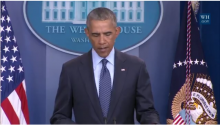
President Barack Obama called the deadly shooting at an Orlando, Fla., nightclub early Sunday morning "an act of terror and an act of hate" in remarks Sunday afternoon. Orlando Mayor Buddy Dyer told reporters that 50 were killed and 53 injured in the shooting at Pulse Orlando, a gay club near the city's downtown.

It’s hard when you’re the one who has had to go through it. And that’s tough — it’s tough when you can pour your heart out to someone and they’re angry or not willing to listen to what you have to say. My hope is they’ll be willing to have a conversation, with compassion and love, even when they don’t understand.

Counseling a gay person to deny his same-sex attraction, to marry a woman, to raise children with her; and then to condemn him when he discovers years later what a futile plan that was — this is not the kingdom of God. What it is is the kingdom of a particular interpretation of the Bible, the kingdom of a theological system turned in on itself, of religious people who, like the older brother in Jesus' story of the Prodigal, refuse to believe that God could be so extravagant with grace.

I have been thinking about what it means for me to try to put myself into the shoes of other people, too. When I see someone who is different from me — a transgender person, a Muslim person, a politically conservative person, an 'any kind of different' person — I am tempted to look at that person through a hermeneutic of fear. I either fight against that person or flee from that person. But what if I look at that person through a hermeneutic of empathy? What if I put myself in that person's shoes and walk around? What might happen if I do that?

While I am a vocally liberal, bisexual justice-seeker and activist, my mom is an engaged and informed lifelong conservative who believes our denomination’s political engagement contradicts the separation of church and state. For this reason, I knew that the historic votes on marriage and several other progressive issues would not be good news for her. In fact, I knew that the senior pastor of her congregation — the church I had grown up in — would leave the denomination over those votes, and that my mom might well be leaving too. Across the vague static of our cell connection, I heard the emotion in her voice as she admitted, “I just feel like my church is leaving me behind.” I shook my head, thinking to myself, “But we don’t want to.” Church had always been a shared home for us, but I wondered if we would ever both feel home in the same church again.

For LGBTQ people of faith, Twitter is becoming a vital space for a diversity of stories to emerge. And these stories — whether of the pastor down the street or of the people sitting in the pews — allow those of us lucky enough to see them a glimpse into the lives of everyday superheroes.
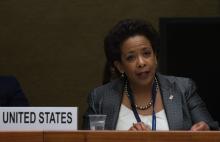
This new guidance from the Obama administration seeks to limit discrimination, harassment, and violence transgender students face, and restricts anything the school might do to question a transgender student's identity.
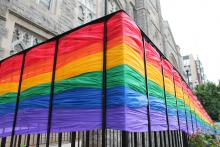
"Dear church, our prayers are with you, with all of us, in the coming days. May we all be surprised by the Spirit who continues to breathe new life in unexpected ways."
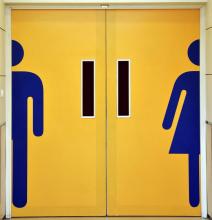
His question about God’s love for him caught me by surprise. We never talked about religion. I was, admittedly, the “churchy” one in my group of friends — president of the Junior Usher Board and active in my church youth ministry. Yet even at the age of 17, devoid of theological training, I understood the core inquiry at the root of the question: Could this Christian God that I proclaimed loved us all so much accept Aaron even when so many of this God’s “followers” did not?
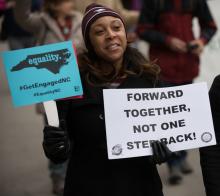
Meeting for a one-day emergency session last week, North Carolina’s General Assembly passed HB2, which has been widely criticized as the nation’s worst anti-LGBT bill. In supposed defense of the general welfare, conservative lawmakers moved to stop a Charlotte ordinance that would have allowed transgender citizens to use public restrooms of the gender with which they identify. But their call to “protect our women and children” echoes language of the white supremacy campaign that overthrew local governments in this state 120 years ago. Both then and now, the call to defend families against imagined predators is a crude power grab.
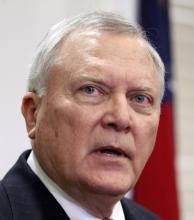
Was it the Hollywood threat to boycott Georgia or the NFL threat to withhold a Super Bowl?
Gov. Nathan Deal didn’t say as he vetoed a bill on March 28 that a chorus of major studios, sports leagues, and business leaders denounced as legalizing discrimination against gay people.
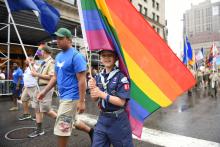
The Boy Scouts of America and the Unitarian Universalist Association signed a new agreement March 24 after the two organizations had previously been divided over gay rights.
“BSA Scout Law defines a Scout by qualities that Unitarian Universalists also lift up,” reads the memorandum of understanding signed by Scouting and Unitarian Universalist officials at the BSA headquarters in Irving, Texas.
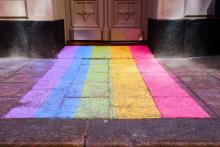
Among the people who Lee studies in Rescuing Jesus is Sojourners’ own Chief Church Engagement Officer Lisa Sharon Harper, who confronted the overwhelming whiteness of her evangelical campus ministry. Despite hearing otherwise from her religious leaders, she knew her whole identity as an African-American woman with a commitment to racial justice was an essential part of her faith.
And many other leaders are featured: Jennifer Crumpton, who grew up hearing conservative gender complementarian teachings, now challenges the patriarchal structures of evangelicalism through her ministry and call to lead. And there’s Will Haggerty and Tasha Magness and other LGBTQ students at Biola University, a private Christian college with explicitly anti-queer policies. Despite the threat of expulsion, these students founded an underground network of support and solidarity for LGBTQ Biolans.

For those of us who live outside South Dakota, these issues may seem too far-removed to touch our lives in a meaningful way. But in the Bible we find that our neighbors continue to be our neighbors, regardless of how far away they live. As Christians, we are called to love and work for the good of our neighbor, and as followers of Jesus we are called to protect the most vulnerable. Surely there must be a way to ensure the safety of all of the children in South Dakota’s school system, and not just the majority.

When people disagree with their church about current issues, some choose to speak with their elders, some look for another church, and others may leave altogether but this Michigan pastor is protesting his denomination by braving the cold and sleeping outside.
Rev. Michael Tupper of Parchment United Methodist Church has been sleeping in a tent in the Michigan winter since Nov. 30 and plans to keep sleeping outside for another 175 nights in protest of stances on sane-sex marriage in the Methodist church.

Archbishop of Canterbury Justin Welby, the “first-among-equals” leader of the world’s Anglican churches, has published his reflection on the 2016 Primates Meeting. The Jan. 11-15 meeting of the leaders, or primates, of the Anglican Communion ended with a three-year suspension of The Episcopal Church’s right to represent the Anglican Communion on interfaith or ecumenical bodies and vote on doctrine and polity because of The Episcopal Church’s unilateral decision to recognize same-sex marriage.

As a black, same-gender loving woman, who is a pastor, Bishop and activist, I can solidly say that my wife, children, grandchildren, and community have stronger allies, greater opportunities, and more protections than we have ever had. This is in many ways attributable to a growing number of black clergy who are no longer willing to stand idly by and watch large segments of the communities they were called to serve alienated, stripped of rights, physically abused, and treated unjustly. They have taken the costly stand against the notion that LGBTQ people are unworthy of God’s love and full acceptance within the church.

As I spoke to other transgender Christians, I found that many expressed frustration with the lack of education on trans issues in their churches. They told me that even though trans people are being recognized in the media, real and relevant conversations are just not happening in the sanctuary or at Bible study. Maybe folks are worried about saying the wrong thing, or perhaps our churches don’t make space for discussion. Whatever the reason, we as Christians are called into fellowship with one another, and real fellowship takes education and communication. In that spirit, here are seven things that transgender people in your congregation wish you knew.

Carson, a renowned neurosurgeon, has compared same-sex marriage to bestiality and pedophilia. He even suggested segregating bathrooms for the transgender population since it was unfair to make non-trans individuals uncomfortable. And this week, Carson referred to trans individuals as “abnormal” and said they should not be given “extra rights.” His comments on the LGBT community may seem outrageous to many — even to those in evangelical and mainline faith traditions who have left the “being gay is a choice” rhetoric in the past. Yet Carson, perhaps the most visibly religious presidential candidate, holds onto many of his anti-LGBT views.
If Carson’s faith affects his politics, it’s important to contextualize his conservative LGBT views with his church affiliation. Indeed, the Seventh-day Adventist Church espouses many similar views, which stem from a long, complicated history with the LGBT community.